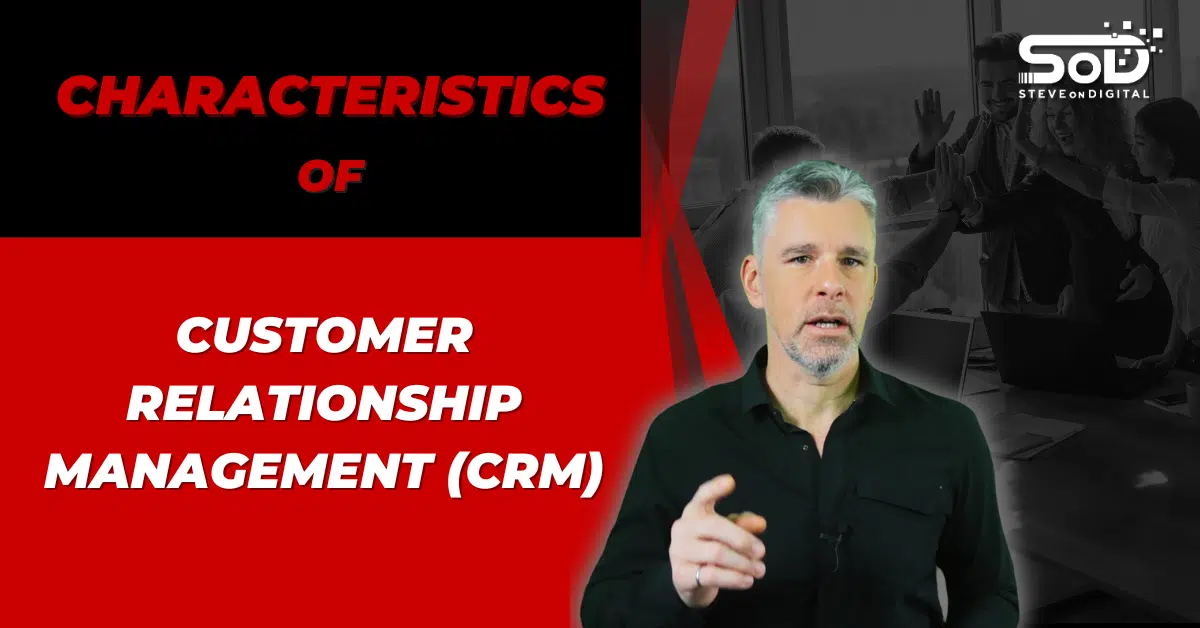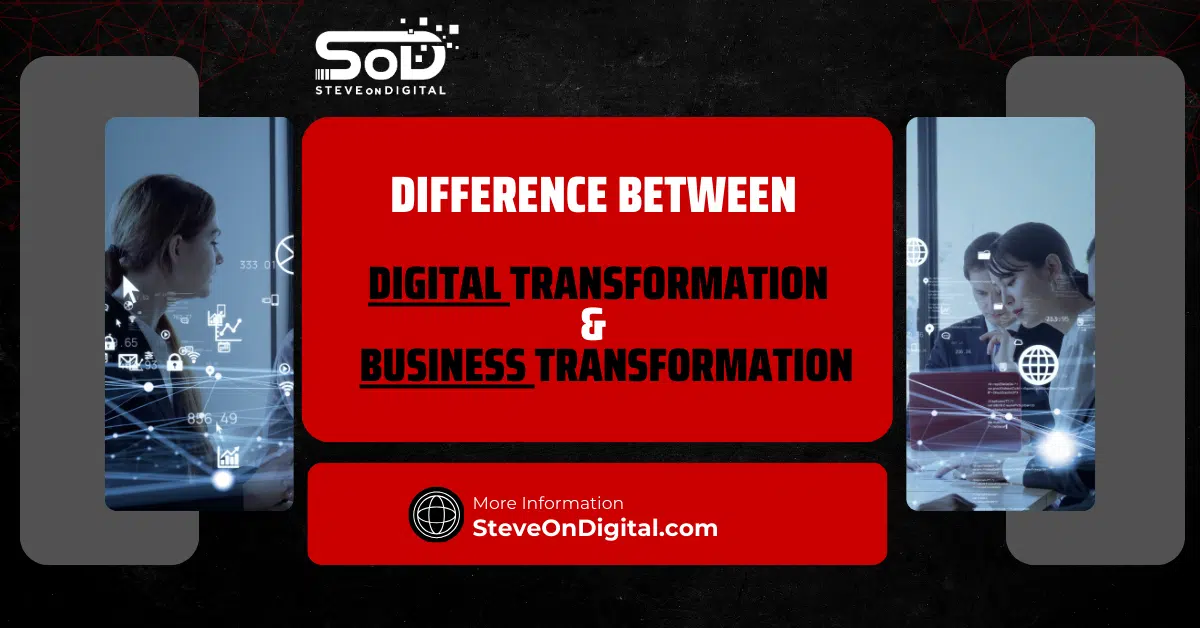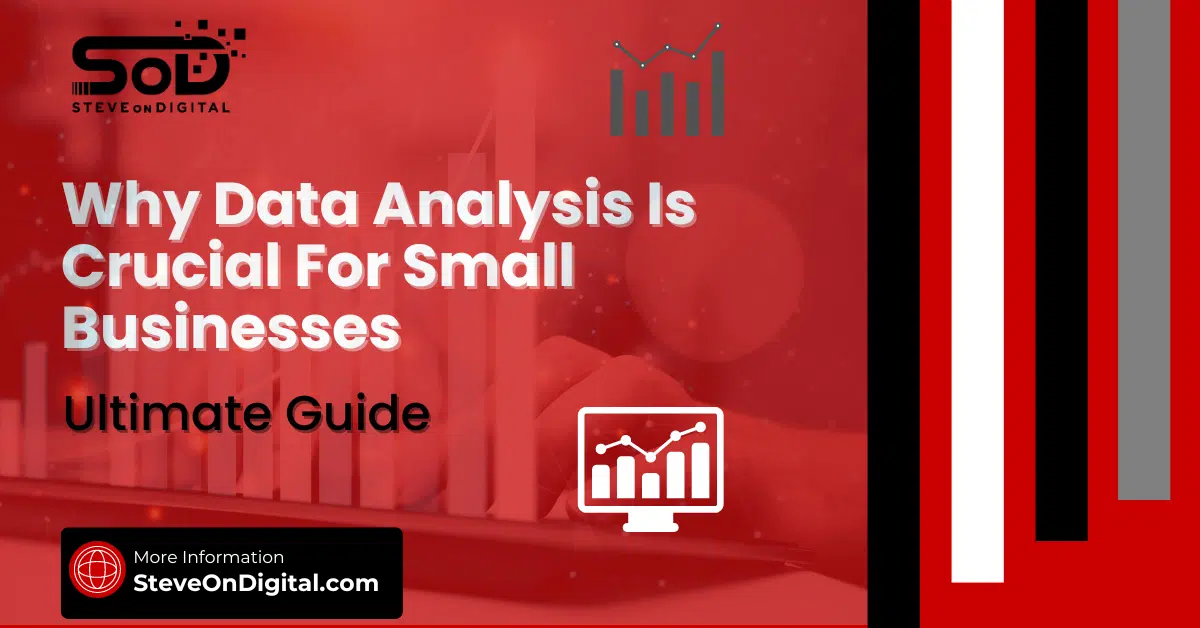Customer Relationship Management (CRM) is about understanding and managing customer interactions to build better business relationships.
Collecting customer data, analyzing interactions and personalizing customer experiences.
To increase customer satisfaction and loyalty, streamline sales and marketing processes and be more efficient.
By using technology, CRM gives you insight into customer behavior so you can tailor your approach to your customer needs.
What is Customer Relationship Management (CRM)
As the founder of SteveOnDigital, I have been in the digital world for many years and have seen the value of Customer Relationship Management (CRM) for myself.
At its heart CRM is about building and maintaining relationships with your customers.
It’s evolved from simple customer tracking systems to complex platforms that can manage and analyze customer interactions across multiple touchpoints.
The goal? To build better business relationships, retain customers and drive sales growth.
Customer Satisfaction with CRM
At the heart of customer relationship management (CRM) is customer satisfaction, the ultimate goal to build positive customer relationships and loyalty.
A good CRM is based on understanding and anticipating individual customer needs and preferences.
By using CRM tools you can offer personalized interactions, responsive service and forward thinking solutions, all of which drive satisfaction.
This focus on customer satisfaction will get repeat business and will build a positive reputation, the foundation for a strong and respected brand.
History of CRM
The history of CRM is a reflection of the pace of technology and the rise of customer centric business.
In the beginning businesses used manual notebooks and spreadsheets to track customer interactions, which was time consuming and error prone.
The introduction of digital CRM systems changed all that, a centralized platform to store customer data, track interactions and automate sales processes.
Today CRM has added AI, cloud and mobile to the mix making CRM more accessible, more powerful and more necessary than ever.
Key Characteristics Of CRM
CRM systems are the foundation of a good customer relationship management strategy.
Let’s break them down:
Integration
One of the biggest benefits of modern CRM systems is they can integrate with other business tools and platforms.
This means all customer interactions, whether by email, social media or the company website can be captured and stored in one place.
For SteveOnDigital this means we have a single view of the customer journey and can make informed decisions and personalize experiences.
Lead Management
Lead management is another important part of CRM.
It’s about tracking potential customers (leads) from the first point of contact through the sales funnel to the sale.
Good lead management means you know where each lead is in the sales process, what actions to take to move them forward and how likely they are to convert to a paying customer.
This is key to optimizing sales and conversion rates.
Customer Data Insights via CRM
Customer data is at the heart of the CRM framework, providing valuable insights into customer behavior, preferences and trends.
The collection, analysis and deployment of this data is key to making business decisions, refining marketing and developing products that resonate with the target market.
CRM software makes this process easier through data segmentation, so you can send targeted communications and bespoke customer experiences that build the relationship between business and customer.
Workflow Automation
Workflow automation is about automating and streamlining repetitive tasks within the CRM.
This could be sending follow up emails, updating sales records or assigning tasks to team members.
Automation saves time and reduces the risk of human error so no customer is missed and every interaction is timely and relevant.
For small businesses and startups this can be a big deal, they can compete with bigger companies by being more efficient and productive.
CRM basics: Customer Engagement
CRM systems are at their heart about building positive customer relationships by managing customer data strategically throughout the customer lifecycle.
From lead management by sales reps to sales forecasting CRM software underpins the sales process, customer service processes and the customer journey.
CRM platforms are the hub for sales teams and marketing automation, where sales and marketing departments can work off the same page, so information flows seamlessly through the sales funnel.
A good CRM strategy uses CRM tools for contact management so sales teams are aligned and marketing teams can launch marketing campaigns quickly.
This ecosystem supports a dynamic sales cycle, customer engagement and customer loyalty.
At the heart of CRM is to increase customer lifetime value through analysis of sales data and customer information so you can personalize customer experiences.
CRM solutions with mobile CRM means sales reps and marketing teams can access critical data, call potential customers directly and automate repetitive tasks to get new customers and retain existing ones.
Good CRM software automates workflow and project management and allows sales CRM and sales analytics to work together to optimize marketing and sales pipeline for deeper customer relationships and ultimately a better understanding of the customer base.
Advanced Features And Trends In CRM
The CRM landscape is changing, new technologies are emerging and businesses are interacting with customers differently.
Here are some of the biggest trends:
Artificial Intelligence And Machine Learning
AI and machine learning are turning CRM systems into predictive tools that can give insights into customer behavior, preferences and potential sales opportunities.
These can analyze huge amounts of data to find patterns and trends so businesses can anticipate customer needs and offer personalized solutions.
In my experience using AI in CRM has allowed us to react to our customers needs but also anticipate them, we can provide a level of service that really differentiates us.
CRM software: CRM success
CRM software is the technological foundation for executing a full CRM strategy, an array of features to improve customer interactions and business processes.
This includes automation of marketing campaigns to management of the sales pipeline and delivery of customer service solutions.
CRM platforms give you a 360 degree view of your customer base and integration with AI and analytics gives you the predictive insights to tailor customer engagement and business strategy.
With CRM technology companies can manage the entire customer lifecycle from lead management to sales cycle to post purchase support with ease and insight.
Blockchain
Blockchain technology gives a new level of security and transparency in managing customer data.
By creating a decentralized and immutable ledger of transactions and interactions businesses can give customers peace of mind about their data.
This is especially relevant in today’s digital world where data breaches and privacy are top of mind for customers.
IOT, AR and VR
Internet of Things, Augmented Reality and Virtual Reality are opening up new channels for customer engagement.
IoT devices can give businesses real time data on how customers are using their products so they can offer support and recommendations in real time.
AR and VR can create immersive shopping experiences so customers can try products before they buy.
These are changing the rules of customer engagement, new opportunities for businesses to connect with customers in new ways.
Full Features Of CRM
CRM systems have many features to meet the specific needs of businesses in managing customer relationships.
Here are some of them:
Customer Segmentation
Customer segmentation is a feature within CRM systems that allows you to segment your customers into different groups based on demographics, buying behaviour and interaction history.
This allows you to tailor your marketing, sales and customer service to each segment.
For example we use customer segmentation at SteveOnDigital to deliver content and offers that resonate with different audience segments, we see a huge improvement in engagement and conversion rates.
Data Driven Decision Making
In today’s digital world making informed decisions is key to business success.
CRM systems have all the data analytics and reporting tools to help you understand customer behavior, sales trends and marketing performance.
This data driven approach allows you to see opportunities for growth, areas to improve and what’s working best.
Using CRM data has helped us shape our strategy at SteveOnDigital so we can adapt and thrive in an ever changing digital world.
Customisation
The ability to customize CRM systems to your business needs is key.
CRM platforms have different levels of customisation from user interfaces and dashboards to workflows and report formats.
This gives businesses the flexibility to customize the CRM to their business processes, user adoption and get the most out of the system.
Customisation has been crucial for us at SteveOnDigital so we can create a CRM environment that matches our business model and processes.
Collaboration Tools
CRM systems come with collaboration tools to facilitate communication and coordination between team members.
These can include shared calendars, task assignments, document sharing and internal messaging systems.
By improving collaboration CRM ensures everyone in the business is on the same page for customer interactions and responsibilities.
This has been especially helpful for our team at SteveOnDigital to deliver consistent and efficient customer service.
Implementation And Management
Implementing a CRM system requires a strategic approach that covers:
Change Management
Introducing a new CRM system means changing existing processes and workflows.
Good change management is key to a smooth transition, minimal resistance and maximum adoption.
This means clear communication, training and support for all users.
We found at SteveOnDigital that involving team members in the CRM selection and implementation process helps build ownership and makes the transition easier.
CRM Training And Adoption
For a CRM system to work users need to be familiar with the system and understand how it benefits their daily work.
Comprehensive training programs, user guides and ongoing support is key to high adoption rates.
We’ve prioritized CRM training at SteveOnDigital with regular sessions and resources so our team can get the most out of the system.
Future Proofing Your CRM
The digital world is always changing and CRM systems need to keep up with new technology and changing business needs.
Choosing a CRM platform that’s scalable, updated regularly and can integrate with new technology is key to future proofing your investment.
At SteveOnDigital we review our CRM strategy regularly to ensure it’s aligned with our long term goals and the latest digital trends.
CRM And Environmental Sustainability
CRM systems help with environmental sustainability by digitizing processes that were previously paper based, reducing physical storage and optimizing business to be more efficient.
For example digital invoicing and e-signatures reduce paper usage, data analytics can optimize marketing campaigns to reduce waste.
At SteveOnDigital we use CRM not just for business efficiency but as a tool for environmental stewardship.
The Psychology Of CRM
Understanding the psychology of customer behavior and decisions is key to CRM.
This means getting into the motivations, expectations and preferences of customers which can impact how businesses approach customer engagement and loyalty strategies.
Emotional Engagement:
Customers are more likely to be loyal to brands that create positive emotions.
CRM helps to map customer journeys and identify touch points where emotional engagement can be increased.
Personalization:
The psychology of personalisation is key to customer satisfaction.
Customers like it when businesses know their individual needs and preferences.
CRM allows for segmentation and targeting so personalisation and offers can be made.
Trust and Transparency:
Building trust with customers means being transparent about how their data is used.
CRM systems can manage consent and preferences so customer relationships are built on trust.
By incorporating these psychological insights into our CRM strategy we’ve been able to build deeper connections with our audience and turn casual interactions into long term relationships.
CRM In Non Profits
CRM isn’t just for for profit businesses; nonprofits can also use CRM to improve their operations and impact:
Donor Management:
CRM systems help non profits track and manage donor information so they can maintain relationships, communicate effectively and encourage ongoing support.
Fundraising Campaigns:
By analyzing donor data nonprofits can tailor their fundraising campaigns to target the right people with the right message and increase donations.
Volunteer Management:
CRM tools can streamline volunteer management from scheduling to communication so those giving their time and skills are fully engaged.
| CRM Feature | Benefit for Non-Profits |
| Donor Management | Streamlines tracking and engagement of donors |
| Fundraising Campaigns | Enhances targeting and effectiveness of campaigns |
| Volunteer Coordination | Simplifies scheduling and communication |
| Event Management | Facilitates planning and execution of events |
| Reporting and Analytics | Provides insights for strategic decision-making |
CRM And Cybersecurity
As CRM systems hold so much customer data, cybersecurity is a major issue.
This data isn’t just about technical measures; it’s about customer trust and compliance with the law.
Data Protection:
Robust security measures like encryption and multi factor authentication are essential to protect customer data from unauthorized access.
Compliance with Regulations:
Businesses must ensure their CRM is compliant with data protection laws like GDPR and CCPA which govern how customer data can be collected, stored and used.
Regular Security Audits:
Regular security audits and vulnerability assessments can help identify and fix potential risks to CRM data.
At SteveOnDigital we take the security of our CRM data seriously, because customer trust is the foundation of our business.
AI Ethics In CRM
The introduction of AI into CRM raises big ethical questions.
While AI can personalize and streamline, it also brings risks around privacy, bias and transparency.
Privacy and Consent:
AI algorithms must respect customer privacy and data must be used ethically.
Customers should have control of their data and know how AI is being used to enhance their experience.
Bias Mitigation:
AI systems are only as unbiased as the data they’re trained on.
Businesses must be aware of and correct biases in their CRM AI algorithms to treat all customers fairly.
Transparency:
Businesses should be transparent about their use of AI in CRM and provide customers with insight into how decisions are made and how data is being analyzed.
We’ve had to consider these ethical dimensions when incorporating AI into our CRM at SteveOnDigital so our use of technology aligns with our values and our customers’ expectations.
CRM For Small Business And Startups
Small business and startups have unique challenges that CRM can solve:
Cost Effectiveness:
Many CRM solutions are designed with small business budgets in mind, offering solutions that grow with the business.
Using cloud based CRM platforms for example can reduce upfront costs and flexibility.
Customer Retention:
For small business building and maintaining customer relationships is key.
CRM helps these businesses personalize interactions, track customer engagement and predict future needs so they can increase customer loyalty and retention.
Agility and Responsiveness:
Startups and small businesses must be agile to survive and thrive.
CRM provides real-time data and insights so they can respond to market changes or customer feedback.
| Feature | Small Business/Startup | Large Enterprise |
| Integration Capabilities | High | High |
| Lead Management | High | Medium |
| Workflow Automation | Medium | High |
| Customer Segmentation | Medium | High |
| Data-Driven Decision Making | High | High |
| Customization | High | Medium |
| Collaboration Tools | Medium | High |
| AI and Machine Learning | Low | High |
| Blockchain | Low | Medium |
| IoT, AR, VR | Low | Medium |
Cultural Awareness In CRM
In a globalized market cultural awareness is key in CRM:
Understanding Cultural Nuances:
Recognising and respecting cultural differences in communication styles, buying behavior and service expectations can make a big difference to customer relationships.
Localized Marketing Strategies:
CRM can help businesses tailor their marketing to local cultures, traditions and languages so it’s more relevant and effective.
Global Relationships:
By being inclusive and culturally aware businesses can expand their reach and build relationships with diverse customer bases.
CRM And The Future Of Work
The future of work is being shaped by digital transformation and CRM is at the cutting edge of this:
Remote Work:
CRM allows remote work by giving access to customer data and collaboration tools from anywhere, at any time.
This is key for businesses that want to attract and retain the best talent.
Digital Collaboration:
CRM has various tools to help team work, from shared calendars and task management to document sharing and communication channels.
These tools enable a more connected and productive remote workforce.
Data-Driven Insights:
As businesses become more data driven in their decision making, CRM becomes more important for collecting and analyzing customer data.
This data centric approach is the future of strategy and customer engagement.
Blockchain For Transparent Customer Relationships
Blockchain technology offers an opportunity to supercharge CRM with unparalleled security and transparency:
Enhanced Trust:
By recording transactions on a decentralized ledger blockchain can give customers peace of mind that their data is secure and private.
Smart Contracts:
These self-executing contracts with the terms written directly into code can automate and simplify processes such as sales agreements, rewards and loyalty programmes within CRM systems.
Data Security:
The immutable nature of blockchain means once customer data is recorded it can’t be changed or deleted, a whole new level of data protection.
CRM And Emerging Technologies
CRM with AI, IoT and blockchain is not a trend, it’s a business imperative for businesses to deliver innovative and personal experiences:
Predictive Analytics:
AI and machine learning can analyze CRM data to predict customer behavior and preferences so businesses can pre-empt customer needs.
Enhanced Customer Interactions:
IoT devices can provide real time data on product usage so businesses can offer timely support and personalisation.
Security and Transparency:
As above, blockchain can supercharge CRM by securing data and building trust through transparency.
Conclusion
So there you have it.
From customer relationships to cultural awareness to emerging technologies to the future of work CRM is the tool for businesses to succeed in the digital world.
At SteveOnDigital our CRM journey has been amazing, we’re more connected to our customers, more efficient and ahead of the curve in a fast changing digital world.
Looking forward the possibilities are endless, more ways to engage with customers and drive business results.




